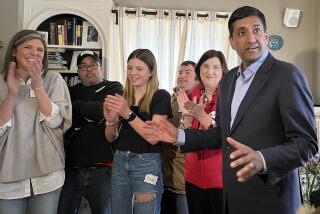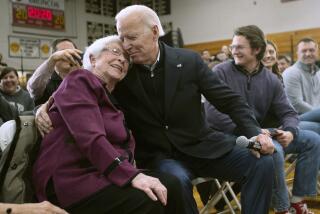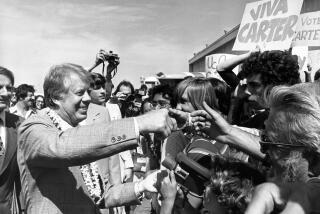Will Dole Be Beached in New Hampshire? : Campaign ‘96: His hucksterism tempts the Yankee proclivity to bring the prematurely self-anointed down to earth.
- Share via
In his collection of poems entitled “North of Boston,” Robert Frost wrote, “Something there is that doesn’t love a wall.” He might have added that there is something north of Boston that doesn’t love a presidential front-runner. It is a place that loves to humble those presidential aspirants who style themselves as the “inevitable” nominees. It is a state where those who finish a close second are proclaimed winners and those who prematurely declare victory are doused by the cold water of political reality. Bob Dole now seems poised to follow in the footsteps of others who imprudently planned their coronations but ultimately failed to gain entry to the throne room.
The strategy pursued by Dole is the same one pursued by such luckless Democrats as Lyndon Johnson in 1964 and Edmund Muskie in 1972. It is a strategy that has failed much more often than it has succeeded. It involves enlisting in your campaign an impressive number of party bigwigs. The theory is that voters take politicians’ recommendations seriously, a questionable assumption these days.
Pursuant to this dubious game plan, Dole has swept back and forth across the country gathering endorsements like some great political reaping machine. Governors seem especially prized. Last week, it was New Jersey’s Christine Whitman. A few weeks ago, it was Michigan’s John Engler. All the while, Dole continues to work his Washington job, dividing his time between the war of attrition over the budget and a position on the U.S. deployment in Bosnia that would be both statesmanlike and politically prudent. What emerges is the picture of a man trying to simultaneously master the fine arts of souffle-making, sword-swallowing and flower-arranging, all while negotiating a tightrope.
Even before last weekend, the strain had begun to show. Dole’s campaign had accepted and then rejected the contribution of a group of gay GOP activists who call themselves the Log Cabin Republicans. Dole’s response was to declare himself totally free of homophobia, leaving no one satisfied as to where he stands on sensitive cultural issues.
But it was on NBC’s “Meet the Press” Sunday morning that the Dole hole began to get ominously deeper. Dole repudiated his party’s absolutist antiabortion plank, an important prop of the GOP platform since 1980. He went further. He abjured his one-time support for a constitutional amendment banning abortion, announced that he might seek out Colin Powell as a running mate and then, for good measure, said that it was no better than even money that the Bosnia operation would succeed, even though he had just spent the previous week garnering support for it.
Offering up this loopy smorgasbord of ruminations, policy reversals and racetrack oddsmaking underscores some serious problems with the Dole campaign.
First off, there is the question of whether the predisposition to deal-making with which all congressional leaders seem to be genetically encoded is compatible with the need for presidential hopefuls to lay things out in a hard-edged and unequivocal manner. Dole tends his stall at a prime location in the Capitol Hill bazaar and has done so with Byzantine flair, but this mercantilist approach carries with it real perils for someone seeking an office that is associated in the minds of Americans more with heroism than hucksterism. The most effective attack on Dole in 1988 by the Bush campaign was to characterize him as “Sen. Straddle,” a candidate more changeable than April weather in New England and more eager to barter than a Yankee peddler.
Swapping and bargaining to achieve a legislative majority is what congressional leaders must do, but they must take care not to go proclaiming a consensus where none exists. Having prematurely had himself anointed as the GOP nominee by a glittering procession of party notables, he has now moved to claim the political center. This is normally done only after you have amassed enough votes in the primaries and been ceremonially ordained at the party convention, not when you have yet to claim a single delegate.
There is nothing that New Hampshire voters like better than to take the wind out of a front-runner’s sails. The problem that then befalls the overconfident candidate is not a temporary becalming but rather an inexorable and uncontrollable drift onto the shoals.
More to Read
Get the L.A. Times Politics newsletter
Deeply reported insights into legislation, politics and policy from Sacramento, Washington and beyond. In your inbox twice per week.
You may occasionally receive promotional content from the Los Angeles Times.










